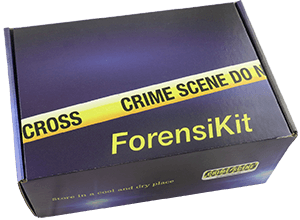Thursday, March 14, 2024 – 11:40 a.m.
Linus Broadwell is employed by the University of Mississippi as the curator of Rowan Oak.
At the detectives' request, Mr. Broadwell came into the Yoknapatawpha County Sheriff's Department for an interview.
Participants:
- Detective T. Armstrong
- Detective S. Murphy
- Linus Broadwell
Detective Murphy: Thank you for coming in to talk with us today. For the record, could you please state your name and address?
Linus Broadwell: I am Linus Broadwell, and I reside at 3063 Davis Drive here in Oxford.
Detective Murphy: And your occupation?
Linus Broadwell: I have been the curator of Rowan Oak since 2013.
Detective Murphy: Okay. We just have a few questions to ask you today.
Linus Broadwell: Well, I do rather hope we can be quick about it. I must get back to Rowan Oak, and frankly, I already took the time previously to tell your officers everything I know.
Detective Armstrong: I'm sure we won't take up too much of your time.
Detective Murphy: Did you see anyone unusual on the grounds yesterday?
Linus Broadwell: As I informed your officers, I am not a security guard. I do not waste my time watching the comings and goings of people on the grounds. That is an activity for which others are employed. So, no, I do not recall seeing anyone unusual. However, that doesn't mean someone couldn't have come around without attracting my attention.
Detective Murphy: How about this: did you hear anything unusual yesterday morning?
Linus Broadwell: I heard some kind of commotion outside, but it did not appear to be any of my concern.
Detective Murphy: You mean the commotion when the body was found?
Linus Broadwell: No, prior to that.
Detective Murphy: Really? What sort of commotion?
Linus Broadwell: I couldn't be sure. It sounded like some kind of vociferous disagreement. Really quite inappropriate for a public place.
Detective Armstrong: Did you see the people involved in this disagreement?
Linus Broadwell: No, I did not. I looked out the window, of course, to determine whether I needed to take any action, but I did not see the parties involved. The disagreement ended shortly thereafter, and I presumed the situation had resolved itself.
Detective Armstrong: Do you know how many people were involved in the disagreement?
Linus Broadwell: I couldn't say for certain, but I would speculate there were two.
Detective Armstrong: But you didn't see either one of them?
Linus Broadwell: As I said, no.
Detective Armstrong: You didn't make any effort whatsoever to try to get a look at them?
Linus Broadwell: I looked out the window, as I said, but I saw nothing.
Detective Armstrong: And you didn't do anything beyond that? Like, say, go to another window in a different part of the house and look out?
Linus Broadwell: Detective, I am a busy man. A personal squabble is hardly any of my concern, even if it does occur right at my front door, metaphorically speaking.
Detective Armstrong: Did you hear what they were saying while they were arguing?
Linus Broadwell: I did not hear their words if that is what you're asking. I did, however, hear their tone and their volume. The hallmarks of such arguments are unmistakable.
Detective Murphy: Do you recall what time you heard this commotion?
Linus Broadwell: No, I do not. Within an hour of the later commotion perhaps.
Detective Armstrong: Is there some reason you didn't mention hearing this commotion or disagreement or whatever you want to call it when you were interviewed before?
Linus Broadwell: I should think the subject did not arise. If I had been asked about it, I'm certain I would have reported it.
Detective Armstrong: Are you saying that they asked you if you saw anything unusual, but they didn't ask you if you heard anything unusual, so you just didn't mention this disagreement you heard?
Linus Broadwell: Detective, I would imagine that in your profession, as in mine, precision is crucial. Because I was not asked about anything I might have heard, I could only conclude that it was unimportant.
Detective Murphy: Do you remember what you were doing yesterday morning when the murder happened? You told our officers that you didn't know anything had happened until you heard the sirens. What were you doing at the time?
Linus Broadwell: I believe that I was examining a recent addition to our collection. We have been lucky enough to come into possession of a letter that Mr. Faulkner wrote to some of his creditors. Due to the number of typographical errors and misspelled words in the letter, I was pondering whether he was inebriated or simply irate.
Detective Armstrong: And what did you decide?
Linus Broadwell: Definitely irate and quite probably inebriated.
Detective Armstrong: Figures. Was anybody with you who can verify your whereabouts?
Linus Broadwell: I need no assistance evaluating Mr. Faulkner's papers, detective. I was alone.
Detective Murphy: Mr. Broadwell, did you know the victim, Rolf Warner?
Linus Broadwell: No, I did not know him either.
Detective Armstrong: Well, I'm looking at two options here. First, you found this man trespassing, maybe behaving inappropriately. Maybe you asked him to stop and leave the grounds, but he refused. You got angry, grabbed the closest weapon, and killed him.
Linus Broadwell: You'll have to do better than a poor "Blue Bloods" imitation, detective. Your assertion is so laughable that I can't even get upset.
Detective Armstrong: Okay, option number two. You recognized Mr. Warner from his tour of Rowan Oak the day before, and when you recalled the argument you had with him on Tuesday, you decided to have the final word.
Linus Broadwell: Once again, your immature ruse cannot work. I already told you I never met that man.
Detective Armstrong: Yes, you did tell us that, but we already know that isn't true.
Linus Broadwell: I beg your pardon! Are you calling me a liar?
Detective Armstrong: Yes.
Linus Broadwell: I will not be spoken to this way, detective. A person of my position and reputation should be treated with respect, not bullied like some common criminal.
Detective Armstrong: With a rap sheet like yours, you look like a pretty common criminal to me.
Linus Broadwell: I—how did you find out about that?
Detective Armstrong: We're the police, Linus. How could you think we wouldn't find out?
Linus Broadwell: Well, be that as it may, those things are in the past. They have no relevance to the matter at hand.
Detective Armstrong: I'm going to have to disagree with you there, Linus. You've shown a propensity for violence. We have to consider whether you had something to do with Rolf Warner's death.
Linus Broadwell: I have most certainly not shown a propensity for violence. Those previous incidents were simply misunderstandings, which you would know if you had any sense at all.
Detective Murphy: Tell us why it couldn't have been you who killed Rolf Warner.
Linus Broadwell: I most certainly will not. That answer should be readily apparent, and if you can't see it for yourselves, then I despair for the state of law enforcement in Yoknapatawpha County.
Detective Armstrong: Have it your way, but until we can clear you, you should know that you're a person of interest in this investigation.
Linus Broadwell: That sounds to me like your problem, detective. It's certainly no concern of mine since I know I am innocent of any crime. Do you intend to hold me at this time?
Detective Murphy: No, sir.
Linus Broadwell: Then, until you come up with a reason for me spending my valuable time here, I have had enough of this silliness.
Detective Murphy: Okay then. You can go. But don't leave town without letting us know.
Linus Broadwell: I note that you have been watching too much "Blue Bloods" as well, Detective Murphy. Good day.
Interview ended – 12:12 p.m.

